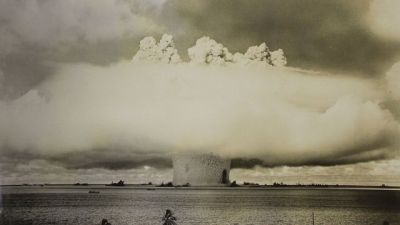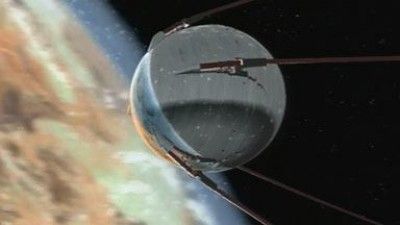The BEST episodes directed by Rushmore Denooyer

#1 - The Bomb
PBS Specials - Season 2015 - Episode 18
The story of nuclear weapons, from the earliest A-bomb tests to their impact on global politics. Included: remarks from historians Richard Rhodes, Martin Sherwin, Robert Norris and Sergei Khrushchev; former secretary of state George Shultz; and former defense secretary William Perry. It began innocently enough. In 1938, two German chemists accidentally discovered how to split the nucleus of the uranium atom: nuclear fission. Einstein’s E=mc² equation predicted that the amount of energy released from just one atom would be enormous. Physicists all over the world immediately realized that fission might make a bomb of extraordinary power - and that Nazi Germany might be capable of creating one. The fear of Adolph Hitler getting a nuclear weapon led to a race to deter him by developing such a bomb first. Thus began a chain of events that would lead inexorably to Hiroshima, the nuclear arms race, the hydrogen bomb, the Cuban Missile Crisis and some of the greatest fear and tension ever in world history. The Bomb explores how what started as simple scientific curiosity ultimately resulted in a weapon capable of ending civilization. The invention, says historian Richard Rhodes, “Was a millennial change in human history: for the first time, we were now capable of our own destruction, as a species.” The program recounts the bomb’s history, as well as the successes, failures and moral dilemmas of the personalities who created it. We learn how it was developed and how it quickly changed everything, from international relations to politics, culture, even sex. No less than the discovery of fire, the bomb marks a dividing line in human history between all that came before it, and everything that follows. For the first time, humans acquired the ability to destroy themselves, and we are still struggling to learn how to live with this awesome power. Decades after it first appeared, the bomb has receded in the public consciousness — but it continues to shap
Watch Now:Amazon#3 - Hubble's Amazing Rescue
NOVA - Season 36 - Episode 11
The best-known scientific instrument in history was dying. After nearly 20 years in space and hundreds of thousands of spectacular images, the Hubble Space Telescope's gyroscopes and sensors were failing, its batteries running down, and some of its instruments were already dead. The only hope to save Hubble was a mission so dangerous that in 2004 NASA cancelled it because it was considered too risky.
#4 - Cold Case JFK
NOVA - Season 40 - Episode 22
For decades, the assassination of John F. Kennedy has fueled dark rumors of conspiracies and mishandled evidence. Now, fifty years later, NOVA asks: Could modern investigators do better? We’ll see how state-of-the art forensic tools would be applied to the investigation were it to happen today. At the same time, NOVA takes a critical look at contemporary cases, like the murders of Nicole Brown Simpson and Ronald Goldman, to reveal how charges of evidence mishandling and human error can mar even scientifically sophisticated detective work. Will forensics ever be truly foolproof, or does modern technology just give a scientific sheen to a practice that will always be more art than science?
#5 - The Fabric of the Cosmos: Universe or Multiverse? (4)
NOVA - Season 38 - Episode 18
Our universe may be just one of an infinite number of worlds that make up the multiverse. In this show, Brian Greene explains why scientists believe this is true and shows what some of these alternate realities might be like.
